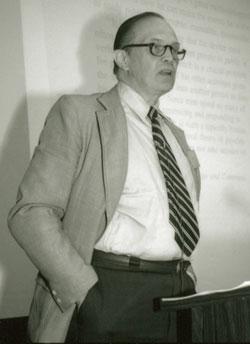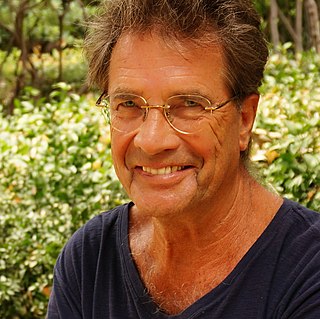The following outline is provided as an overview and topical guide to linguistics:
William Labov is an American linguist widely regarded as the founder of the discipline of variationist sociolinguistics. He has been described as "an enormously original and influential figure who has created much of the methodology" of sociolinguistics. He is a professor emeritus in the linguistics department of the University of Pennsylvania and pursues research in sociolinguistics, language change, and dialectology. He retired in 2015 but continues to publish research.

George Armitage Miller was an American psychologist who was one of the founders of cognitive psychology, and more broadly, of cognitive science. He also contributed to the birth of psycholinguistics. Miller wrote several books and directed the development of WordNet, an online word-linkage database usable by computer programs. He authored the paper, "The Magical Number Seven, Plus or Minus Two," in which he observed that many different experimental findings considered together reveal the presence of an average limit of seven for human short-term memory capacity. This paper is frequently cited by psychologists and in the wider culture. Miller won numerous awards, including the National Medal of Science.
Critical discourse analysis (CDA) is an interdisciplinary approach to the study of discourse that views language as a form of social practice. CDA combines critique of discourse and explanation of how it figures within and contributes to the existing social reality, as a basis for action to change that existing reality in particular respects. Scholars working in the tradition of CDA generally argue that (non-linguistic) social practice and linguistic practice constitute one another and focus on investigating how societal power relations are established and reinforced through language use. In this sense, it differs from discourse analysis in that it highlights issues of power asymmetries, manipulation, exploitation, and structural inequities in domains such as education, media, and politics.
Intertextuality is the shaping of a text's meaning by another text, either through deliberate compositional strategies such as quotation, allusion, calque, plagiarism, translation, pastiche or parody, or by interconnections between similar or related works perceived by an audience or reader of the text. These references are sometimes made deliberately and depend on a reader's prior knowledge and understanding of the referent, but the effect of intertextuality is not always intentional and is sometimes inadvertent. Often associated with strategies employed by writers working in imaginative registers, intertextuality may now be understood as intrinsic to any text.

Jonathan Potter is Dean of the School of Communication and Information at Rutgers University and one of the originators of discursive psychology.

Discourse analysis (DA), or discourse studies, is an approach to the analysis of written, vocal, or sign language use, or any significant semiotic event.
Reading comprehension is the ability to process written text, understand its meaning, and to integrate with what the reader already knows. Comprehension specifically is a "creative, multifaceted process" dependent upon four language skills: phonology, syntax, semantics, and pragmatics.

Teun Adrianus van Dijk is a scholar in the fields of text linguistics, discourse analysis and Critical Discourse Analysis (CDA).
Rhetoric of science is a body of scholarly literature exploring the notion that the practice of science is a rhetorical activity. It emerged following a number of similarly-oriented disciplines during the late 20th century, including the disciplines of sociology of scientific knowledge, history of science, and philosophy of science, but it is practiced most fully by rhetoricians in departments of English, speech, and communication.

Composition studies is the professional field of writing, research, and instruction, focusing especially on writing at the college level in the United States. The flagship national organization for this field is the Conference on College Composition and Communication.
Group cognition is a social, largely linguistic phenomenon whereby a group of people produce a sequence of utterances that performs a cognitive act. That is, if a similar sequence was uttered or thought by an individual it would be considered an act of cognition or thinking. The group can be a small group, such as 3–5 people talking together or working together online. The group can also be a larger collective, such as a classroom of students or a global community contributing asynchronously to an extended discourse on a problem or topic or to a knowledge repository like Wikipedia. The theory of group cognition is a postcognitivism philosophy, which considers a larger unit of analysis than an individual mind as a producer of cognitive activities such as creative problem solving.
Linda Flower is a composition theorist. She is best known for her emphasis on cognitive rhetoric, but has more recently published in the field of service learning. Flower currently serves Carnegie Mellon University as a professor of rhetoric.
The following outline is provided as an overview of and topical guide to communication:
Linguistics is the scientific study of human language. It entails the comprehensive, systematic, objective, and precise analysis of all aspects of language — cognitive, social, environmental, biological as well as structural.

Discourse & Communication is a quarterly peer-reviewed academic journal that covers the fields of discourse analysis and social communication by focusing on topics in communication analyzed with discourse analytical methods. The journal was established in 2007 by Teun A. van Dijk, who still is the editor-in-chief.
Media linguistics is the linguistic study of language use in the media. The fundamental aspect of media linguistics as a new systematic approach to the study of media language is that media text is one of the most common forms of language existence today. It studies the functioning of language in the media sphere, or modern mass communication presented by print, audiovisual, digital, and networked media. Media linguistics investigates the relationship between language use, which is regarded as an interface between social and cognitive communication practice, and public discourse conveyed through media.

Critical realism is a philosophical approach to understanding science, and in particular social science, initially developed by Roy Bhaskar (1944–2014). It specifically opposes forms of empiricism and positivism by viewing science as concerned with identifying causal mechanisms. In the last decades of the twentieth century it also stood against various forms of postmodernism and poststructuralism by insisting on the reality of objective existence. In contrast to positivism's methodological foundation, and poststructuralism's epistemological foundation, critical realism insists that (social) science should be built from an explicit ontology. Critical realism is one of a range of types of philosophical realism, as well as forms of realism advocated within social science such as analytic realism and subtle realism.
Martin Nystrand is an American composition and education theorist. He is Louise Durham Mead Professor Emeritus in the Department of English at the University of Wisconsin–Madison and Professor Emeritus of Education at the Wisconsin Center for Education Research.
Greg Myers is an American linguist. He is currently an Emeritus professor at the Department of Linguistics and English Language of Lancaster University, United Kingdom. His research focuses on applied linguistics with a special focus on critical discourse analysis.






